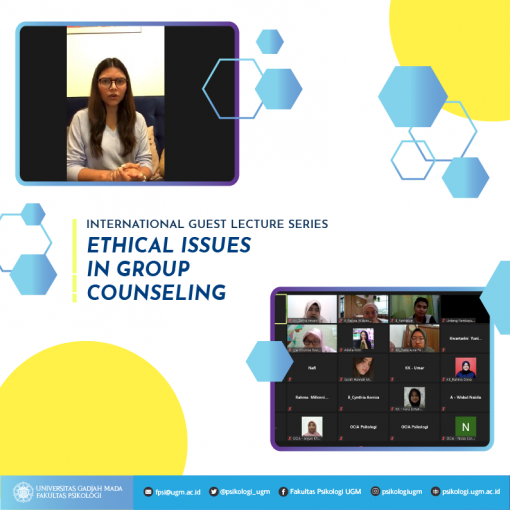
Tuesday (23/3) Office of Cooperatian, International Affairs, and Alumni (OCIA) Faculty of Psychology UGM held a guest lecture with the topic “Ethical Issues in Group Counseling”. The event, which was attended by 150 participants, took place from 07.30 WIB to 09.10 WIB. This event is a series of International Guest Lecture Series events held by OCIA this year.
The keynote speaker for this event was Manali Roy, Ph.D, who is a Clinical Psychologist from the North Central Bronx Hospital. Roy explained about group therapy, including the types of group therapy, namely therapy groups open, close, psychoeducational groups, and process-oriented groups. “A closed group is something where everyone starts at one point and everyone ends at the same point and no one gets out of the group,” explained Roy.
Meanwhile, psychoeducational groups are therapy groups that select a topic and then discuss it by a therapist who acts as a teacher. Topics or issues chosen include overcoming anxiety, “Therapists teach healthy skills and set goals for groups”, explains Roy. In addition, in psychoeducational groups, a therapist does not need to pay too much attention to the dynamics between members of the group. Slightly different from psychoeducational groups, process-oriented groups have an agenda that pays more attention to the dynamics that occur in the group, “How someone behaves, how someone responds to others”.
Then the explanation was followed by exposure related to therapeutic factors. There are 13 things that become therapeutic factors, one of which is universality. The meaning of universality is when members of the group share about their feelings, share thoughts, or some problems that may be the same, it will make you feel not alone when facing everything. “Feelings of feeling not alone are the most important factor in group therapy because members will understand that many people also have many difficult problems, have different problems and feelings of not being alone help members in the therapy process”, explained Roy.
In addition to explaining the type of therapy group and therapeutic factors, Roy also explained its relation to the general principles of standard group counseling ethics. Based on Roy’s explanation, there are five general principles of ethical standards, namely beneficience and nonmaleficence, fidelity, and responsibility, integrity, justice, and respect for people’s rights, and dignity. Then Roy continued his explanation of the code of ethics, which consisted of several things, including resolving ethical issues, competence, human relations, privacy and confidence, and so on.
After the material presentation session ended, the committee opened a question and answer session for the participants. Although at first they looked doubtful due to limited language skills, in the end the participants actively asked questions after the committee gave encouragement not to be afraid of making mistakes even though their English language skills were limited. The committee hopes that by holding this event the participants can understand more about the code of ethics related to group counseling so that in the future there will be no violation of the code of ethics that can harm various parties.
